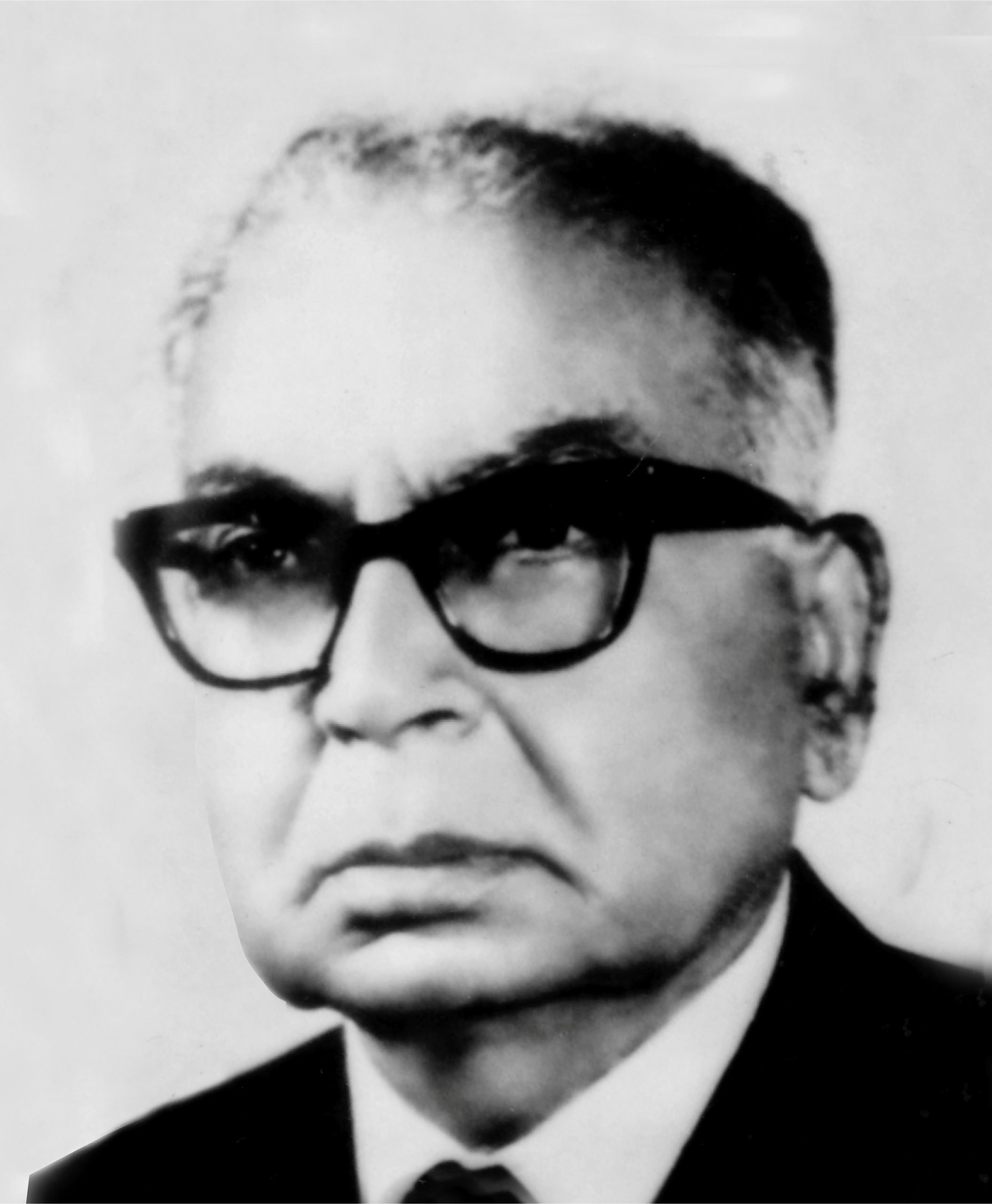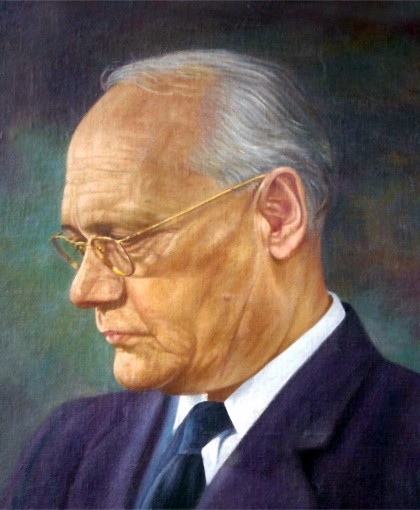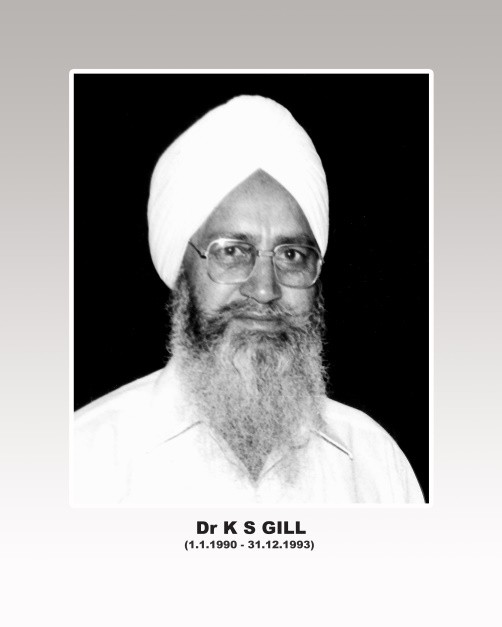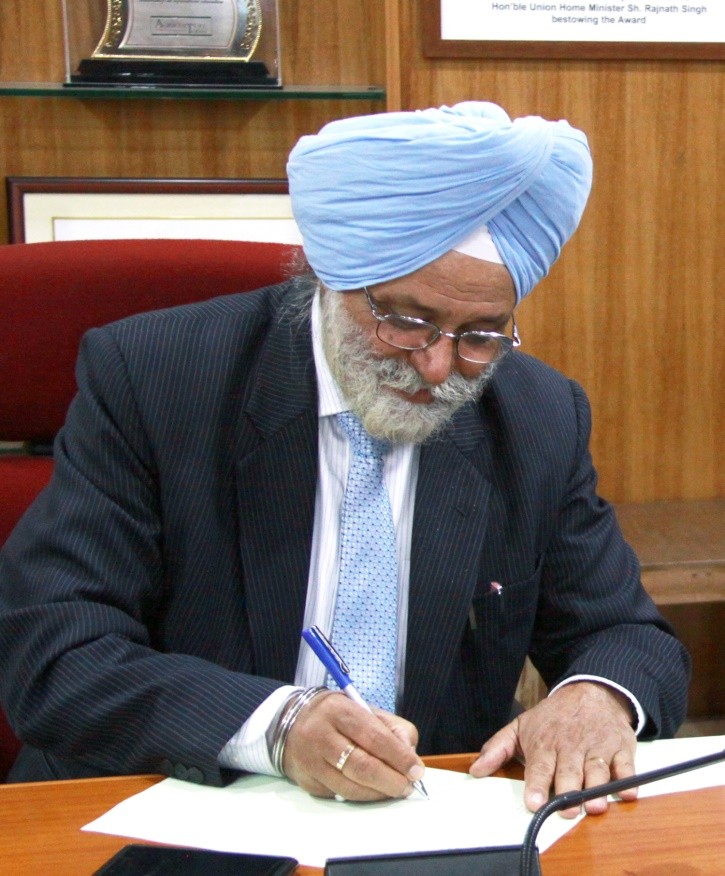
Dr Prem Nath Thapar, the first Vice-Chancellor of the Punjab Agricultural University, began his four-year tenure on October 17, 1962. Although he received an extension, his health forced him to curtail his second term, and on October 11, 1968, he relinquished his responsibilities, bidding farewell to the institution he had nurtured.
Dr Thapar’s indelible mark on PAU cannot be understated. He played a vital role in establishing and nurturing the university, forming a team of scientists who triggered Punjab’s Green Revolution. With discerning insight, he handpicked individuals who would drive the university’s growth and propel it to unprecedented heights. Recognizing his outstanding contributions, Ohio State University conferred on him an honorary Doctor of Science degree at a special convocation held at PAU on March 15, 1969. This extraordinary event in a foreign land highlighted Dr Thapar’s exceptional achievements in orchestrating the university’s early progress.
A firm believer in the transformative power of education, research, and extension in revitalizing Indian agriculture, Dr Thapar spearheaded the Agricultural University movement in India. His unwavering dedication and tireless pursuit of institutional reform will be gratefully remembered.
Born on April 13, 1903, Dr Thapar was a highly respected Civil Servant. A distinguished alumnus of Oxford’s St. John’s College, he triumphed in the Indian Civil Services exam. His commendable service as Settlement Officer in Jhelum and Divisional Commissioner in Lahore and Jalandhar earned him remarkable acclaim. Notably, as Financial Commissioner, he led refugee relief and rehabilitation post-partition. Additionally, his crucial contributions as Administrator during Chandigarh’s formative years shaped the city’s development.
Dr P.N. Thapar departed from this world in Chandigarh on November 11, 1982. His enduring legacy in Indian agriculture and education continues to touch countless lives. A beacon of inspiration for those seeking to create meaningful change, his memory lives on.

Dr M.S. Randhawa, ICS, donned the mantle of Vice-Chancellor from October 23, 1968, till October 27, 1976. His prodigious efforts in agricultural education, research, and support for the farming community garnered him the coveted Padma Bhushan in 1972. Revered as the “Sixth River of Punjab,” Dr Randhawa left an indelible mark across diverse domains such as agriculture, governance, art, history, folklore, literature, and institution building.
Born in Zira on February 2, 1909, he obtained an M.Sc. in Botany from Government College, Lahore in 1930. Recognizing his remarkable achievements, he received an honorary D.Sc. from Ohio State University, USA. Joining the Indian Civil Service (ICS) in 1934, he served in the U.P. cadre and played a vital role as Deputy Commissioner of Delhi. He orchestrated the historic event on August 15, 1947, where Pt Jawaharlal Nehru unfurled the Tricolour at the Red Fort. From Faizabad to Almora to Saharanpur, he left an indelible mark before his transfer to Punjab.
Serving as Director General of Rehabilitation in Jalandhar, Dr Randhawa adeptly managed the refugee influx. His leadership as Vice-President of the Indian Council for Agricultural Research and Vice-Chancellor of PAU paved Punjab’s path to Green Revolution.
As the first Chief Commissioner of Chandigarh, he transformed the city into a verdant haven through innovative landscaping and a deep love for plants. He initiated the national tree planting week, Van Mahotsav, partnered with renowned architects, Le Corbusier and Pierre Jeanneret, in Chandigarh’s bio-aesthetic planning, established institutions such as the Chandigarh Museum, Punjab Arts Council, Museum of Cultural Heritage of Punjab in Ludhiana, and landmarks including the Rose Garden, Government Museum and Art Gallery in Chandigarh, and the Anglo-Sikh Wars Memorial near Ferozepur.
At PAU, he nurtured scientists, propelling them towards advanced education and research. His vision shaped PAU’s landscape, art, museums, library, and plantations. A rare blend of administrator and agriculturist, Dr Randhawa passed away on March 3, 1986, leaving a lasting legacy.

Dr Sukhdev Singh, a remarkable figure in the realm of agricultural academia, held the prestigious position of Vice-Chancellor of PAU on two separate occasions, firstly, for a brief period from November 8 to November 29, 1976; and later for two consecutive terms, spanning from November 22, 1981, to December 31, 1989. Earlier Dr Sukhdev Singh had already established his eminence as the Vice-Chancellor of Jawahar Lal Nehru Krishi Vishwa Vidyalaya in Jabalpur, from 1979 to 1981.
Embarking on his journey at PAU, Dr Sukhdev Singh commenced his scholarly pursuits on January 19, 1960 as an Economic Botanist specializing in sugarcane. This career move came on the heels of his tenure as the Assistant Sugarcane Agronomist in the Department of Agriculture, Punjab, from 1941 to 1959. He earned his Ph.D. from the Louisiana State University, USA in 1966. Rising through the ranks, he became the Head of the Department of Plant Breeding and later the Director of Research. He then assumed the role of Deputy Director General at the Indian Council of Agricultural Research, overseeing crop sciences starting from June 1974.
Additionally, Dr Sukhdev Singh held positions as the Director of the National Seeds Corporation and State Farms Corporation, President of the Indian Agricultural Universities Association, and Trustee on the Board of the International Rice Research Institute in Manila.
Born on November 1, 1919, in Village Dumna of District Ambala, Dr Sukhdev Singh secured his B.Sc. degree from Panjab University, Lahore, Pakistan, and his M.Sc. degree from the venerable institution in Chandigarh.
Sadly, the world bid farewell to this exceptional scholar on November 25, 2008, in Ludhiana. Although his physical presence may have departed, his legacy continues to inspire and guide future generations in their quest for a sustainable and prosperous future.

Dr Amrik Singh Cheema assumed the prestigious position of Vice-Chancellor on a December 18, 1976 and remained at the helm of affiars until March 31, 1981. The nation acknowledged his exceptional endeavors by adorning him with the prestigious Padma Shri, an emblem of his remarkable contributions to the field of agriculture. The Punjab Government also recognized his immense contributions towards increasing agricultural production, and felicitated him with a Gold Medal.
Hailing from the village of Badhai Cheema in what is now Pakistan, Dr Cheema carried his roots with pride. He completed his Doctorate in Agriculture Extension from the Cornell University, USA in 1952. From humble beginnings as an Agricultural Inspector, he ascended the rungs of success, occupying coveted positions such as Director of Agriculture in Punjab from 1963 to 1966, as the Commissioner for Agriculture in New Delhi from 1966 to 1973 and later as Agriculture Advisor to the World Bank from 1973 to 1976, where he stood at the forefront of agricultural development, shaping policies and driving initiatives that resonated on a global scale. Thereafter, Dr Cheema assumed the mantle of leadership at PAU, in 1976.
He established the Punjab Young Farmers’ Association, an altruistic endeavor aimed at nurturing the budding talents of the youth and fostering agricultural development. He also founded the Rural Youth Volunteers Corps that aimed at providing rural youngsters with invaluable training in agriculture and other vital skills. Recognizing the need to disseminate knowledge and technology, he established the Young Farmers’ Training Center in Rakhra, a beacon of wisdom for farmers far and wide.
Dr Cheema bid farewell to this mortal realm on July 18, 1982. Nevertheless, his legacy lives on, forever imprinted in the hearts of those who strive for progress in the agricultural landscape.

Dr Khem Singh Gill, as the Vice-Chancellor of PAU from 1990 to 1993, revolutionized plant breeding and received the prestigious Padma Bhushan in 1993. His passion led to the development of 30 remarkable crop varieties, including disease-resistant wheat and high-yielding pearl millet hybrids. These cultivars gained nationwide acclaim for their resilience against yellow rust, brown rust, Karnal bunt, and ergot. Dr Gill’s leadership in the State Govt’s. Wheat Improvement Program transformed wheat production, ensuring sustenance for millions globally.
Starting as a Research Assistant for the Punjab Government’s Department of Agriculture, he ventured into PAU as an Assistant Oilseed Breeder. Thereafter, he left for University of California in 1963 to pursue his doctoral degree, funded by the Rockefeller Foundation. Returning to India after obtaining his PhD in genetics in 1966, he assumed the roles of Professor and Head of the Department of Genetics at PAU, where he played a vital role in enhancing research facilities at the University’s Regional Research Stations, in addition to introducing research programs at the Hisar and Ludhiana campuses. Later, Dr Gill’s illustrious career saw him serve as Dean of the College of Agriculture, Director of Research, and Director of Extension Education. As Founder of the Crop Improvement Society of India, Dr Gill held prestigious positions such as President of the Indian Society of Genetics and Plant Breeding, and Vice-President of the Indian Society of Genetics.
Born on September 01, 1930, in Kaleke village, district Moga, Dr Gill graduated in Agriculture in 1949 from Khalsa College, Amritsar and obtained his M.Sc. in 1951 from the Panjab University, Chandigarh. He was honored with the prestigious Rafi Ahmed Kidwai Memorial Prize in 1966. Furthermore, the Mexican government and the International Maize and Wheat Improvement Centre (CIMMYT) Mexico, awarded him medals for his significant contributions to wheat research in 1973 and 1993, respectively.
With a heavy heart, the world bid farewell to Dr Gill on September 17, 2019, in Ludhiana. His legacy lives on in the realms of agricultural science.

Dr Amarjit Singh Khehra steered the ship of PAU towards unprecedented heights as Vice-Chancellor from January 1, 1994 to December 31, 1997. Under his astute guidance, PAU attained unparalleled success, garnering the prestigious ‘ICAR Best Institution Award’ in1995. His expertise as a visionary maize breeder propelled him to the forefront of agricultural diversification. In recognition of his groundbreaking work, the Indian Council of Agricultural Research honored him with the esteemed Rafi Ahmed Kidwai Memorial Prize in 1986-87.
Embarking on his journey at PAU as an Assistant Cotton Botanist in 1964, Dr Khehra’s passion for innovation and exploration drove him towards maize breeding in January 1969. He was further appointed as the Head of the Department of Plant Breeding in February 1984 and later as the Director of Research in 1991. He also served on several national-level committees of the Indian Council of Agricultural Research.
Dr Khehra was born in Lyallpur district of Punjab (now in Pakistan), on June 15, 1934. During Partition, his family moved to a quaint village nestled in the heart of Jalandhar district. Dr Khehra embarked on his academic voyage and obtained his B.Sc. degree from Government Agriculture College, Ludhiana, in 1953; his M.Sc. at the Panjab University in 1959, and finally his Ph.D. from the hallowed halls of PAU in 1968.
Dr Khehra’s contributions to the field of maize breeding were nothing short of extraordinary, as he meticulously developed improved maize varieties that promised to revolutionize the agricultural landscape. Upon retiring from PAU, he found a new calling – the noble mission of advocating for the rights and welfare of senior citizens. In this new chapter of his life, he championed the cause of those whose voices often went unheard.
However, as the hands of time continued their ceaseless march, the world bid farewell to this beacon of knowledge and compassion on October 25, 2018. Beyond his scientific accolades, Dr Khehra will forever be remembered for his spirited persona, a man whose passion blazed brighter than the sun itself.

Dr Gurcharan Singh Kalkat, a prodigious renaissance man, ably held the reins of PAU as the Vice-Chancellor from April 14, 1998, to March 31, 2001. The Government of India honoured him with the Padma Shri in 1981 and the Padma Bhushan in March 2007 for his exemplary services to the advancement of sustainable agriculture.
Born on June 17, 1926, in Sahora village, Hoshiarpur, Dr Kalkat did his B.Sc. in Agriculture from Punjab Agriculture College, Lyallpur (now in Pakistan) in 1947, M.S.c. in Agriculture from Panjab University, Solan, in 1956 and Ph.D. in Agricultural Zoology Entomology from Ohio State University, USA, in 1958, earning the “Distinguished International Student Award.” Later, as a mark of honour and gratitude, he also received honorary Doctor of Science degrees from Punjab Agricultural University, Ludhiana, and Punjabi University, Patiala.
Dr Kalkat’s impressive career included serving as the Deputy Director of Agriculture, Punjab, in 1960; Director of Agriculture in 1971; and Agriculture Commissioner/Additional Secretary of Agriculture, Ministry of Agriculture, Government of India (1973-1978). He also served as the Vice-Chairman of Central Commodity Committees, and later as a Senior Agriculturist with the World Bank from 1978 to 1989 and supervised World Bank-assisted programs in India, Sri Lanka, Nepal, Indonesia, Nigeria and Ghana. Additionally, he played a key role as a member of the Steering Group of the Planning Commission, Government of India, in devising the ‘National Agriculture Development Programme’ (RKVY) to enhance resource efficiency, food security, and agricultural development in underperforming areas of the country.
While serving as the Chairman of the Punjab State Farmers’ Commission for 12 years, Dr Kalkat advised the government on policy matters related to farmers, agriculture sustainability, soil and water conservation, and environmental concerns.
Dr Kalkat passed away on January 27, 2018, leaving a profound void. His indomitable spirit breathed life into the very soil of Punjab, transforming it into a thriving haven of abundance. His extraordinary journey in this world paved the way for a bountiful future.

Dr Kirpal Singh Aulakh embarked on a transformative journey at Punjab Agricultural University, initially assuming the mantle of pro-Vice-Chancellor on November 9, 1999, and rose to the prestigious position of Vice-Chancellor on April 1, 2001 steering the university towards remarkable progress until April 6, 2007.
Dr Aulakh initiated sweeping reforms to resuscitate the agricultural landscape of Punjab. Recognizing the importance of fostering global collaboration and knowledge exchange, Dr Aulakh deftly established ties with numerous foreign universities and institutions, thus harnessing the collective wisdom of diverse minds to further agricultural advancements.
Dr Aulakh’s academic journey commenced with obtaining a B.Sc. in Agriculture in 1962, followed by an M.Sc. and a Ph.D. in Plant Pathology in 1964 and 1968, respectively. Starting his tenure at the university as an Assistant Plant Pathologist in September 1968, Dr Aulakh ascended to the position of Head of the Department of Plant Pathology in 1986, and later, assumed the role of Dean of the College of Agriculture (September 1989-May 1994), He, then, took on the mantle of Director of Research from June 1994 to November 1999 lending his expertise to steer the institution towards ever-greater heights of excellence.
Dr Aulakh’s legacy encompasses the monumental achievement of securing a “special grant” of Rs. 100 crore for PAU announced in the budget speech by the then Union Finance Minister, Mr. P. Chidambaram, on February 28, 2006. This substantial financial injection stands as a resounding recognition of PAU’s contributions to the inception of the first green revolution — an acknowledgment that resonates with the entire nation.
Dr Kirpal Singh Aulakh has now embraced a retired life in the vibrant city of Ludhiana. Though he may have relinquished his official responsibilities, his impact continues to reverberate within the hallowed halls of Punjab Agricultural University, forever etching his name in the annals of its storied history.

Dr Manjit Singh Kang, a name that resonates with excellence and a visionary approach, graced the position of Vice-Chancellor at the Punjab Agricultural University from April 30, 2007 to April 30, 2011.
Dr Kang’s scholarly journey began with graduating from PAU in 1968. He pursued a Master’s degree in Plant Genetics at Southern Illinois University, Edwardsville, in 1971 and furthered his studies at the Carbondale campus of the same university, earning an MA in Botany in 1977. He obtained his Ph.D. in Crop Science from the University of Missouri, Columbia, in the same year.
Dr Kang’s exceptional acumen led him to prestigious American institutions, starting as a Research Associate at Washington University in St. Louis in 1977 and later becoming a Professor of Quantitative Genetics at Louisiana State University in 1990. He earned Fulbright Senior Scholar designation in Malaysia in 1999 and occupied the Chair of the National Selection Committee for Fulbright-Nehru Senior Research Scholar awards in 2010 and 2011.
Dr Kang’s prolific ouvre comprises a cache of scholarly publications in quantitative genetics and crop improvement. He holds prestigious Fellowships, and served as Editor-in-Chief of Communications in Biometry and Crop Science. Presently, he is the Editor-in-Chief of the Journal of Crop Improvement and the Technical Editor of Crop Science.
Dr Kang remains deeply connected to the needs of his homeland’s agriculture and was awarded the esteemed ‘Pride of Punjab’ award by the Chief Minister of Punjab in 2018. Additionally, the Punjab Government bestowed upon him the distinguished ‘Sri Guru Nanak Dev Ji Achievers’ Award’ in November 2019.
Dr Kang imparts his knowledge and expertise as an Adjunct Professor in the Department of Plant Pathology at Kansas State University, Manhattan. He is also the honorary Visting Professor in PAU since 2022. His intellectual odyssey embodies the relentless pursuit of knowledge, the cultivation of a cosmopolitan worldview, and an unwavering commitment to advancing agricultural science.

Dr Baldev Singh Dhillon served as the longest-serving Vice-Chancellor of PAU, Ludhiana from July 01, 2011 to June 30, 2021. With expertise in the realms of plant breeding, genetics, and genetic resources, his illustrious career included pivotal roles such as Director of Research at Guru Nanak Dev University and Director of the National Bureau of Plant Genetic Resources. Dr Dhillon’s global pursuits took him to the University of Hohenheim in Germany and CIMMYT in Mexico, where his scientific prowess shone brightly.
Born on June 27, 1947, in the quaint village of Daburji, Dr Dhillon earned his doctorate from the renowned Indian Agricultural Research Institute in New Delhi after his M.Sc from PAU, Ludhiana and B.Sc. (Agriculture) from Khalsa College, Amritsar. He embarked on his tenure at PAU as an Assistant Maize Breeder in 1974, ascending to the ranks of the Director of Research. Dr Dhillon’s exceptional accomplishments garnered numerous international scholarships, prestigious fellowships, and accolades. The Punjab Academy of Sciences bestowed upon him the Lifetime Achievement Award. The prestigious Padma Shri was bestowed upon him by Government of India in 2019.
During his tenure as PAU Vice-Chancellor and Director of Research, Dr Dhillon orchestrated resource rationalization and Inter-Departmental Research Planning, kindling an upsurge in studies encompassing natural resource utilization, plant biotechnology, crop enhancement, food technology, processing and nutrition, integrated pest management, nutrient optimization, vegetable net house farming, and farm power machinery. His singularly remarkable efforts in breeding and production technology enabled the cultivation of spring and winter maize varieties and hybrids during non-traditional seasons, forever altering the agricultural landscape.
Under Dr Dhillon’s tutelage, PAU fostered robust alliances with industry and also established Intellectual Property Rights and Technology Commercialization Cell. The PAU also earned the ‘Sardar Patel Outstanding ICAR Best Institution Award’ in 2017.
Dr Dhillon now enjoys a well-deserved retirement in Mohali and visits his children in Australia often.